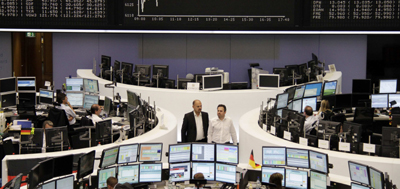Monday, 06 July 2015 16:01
 LONDON: The euro zone’s blue-chip share index fell 1.7 percent on Monday after Greek voters rejected austerity measures demanded in return for a debt deal, raising concerns about the country’s possible exit from the euro zone.
LONDON: The euro zone’s blue-chip share index fell 1.7 percent on Monday after Greek voters rejected austerity measures demanded in return for a debt deal, raising concerns about the country’s possible exit from the euro zone.
Banks were the worst hit, with the Euro STOXX banks index down 2.1 percent. Italy’s Unicredit and Intesa Sanpaolo both were down more than 3 percent. Spain’s Santander, France’s Societe Generale and Germany’s Deutsche Bank all fell about 2.5 percent.
The euro zone’s blue-chip Euro STOXX 50 index was down 1.7 percent by 0803 GMT after setting a five-month low, while the pan-European FTSEurofirst 300 index fell 1.2 percent. However, Monday’s fall was not as strong as some had expected, considering markets had been betting on a rapid resolution of the crisis going into the weekend.
J.P.Morgan economists reckoned the outcome of Sunday’s referendum would probably hasten Greece’s exit from the euro.
Neil Williams, chief economist at Hermes Investment Management, said that was not yet a done deal.
“Markets have yet to be convinced in full either that the exit door will be open or that the extent of any contagion from this could be irreparably damaging to the system,” he said. European leaders called a summit for Tuesday to discuss their next move after the surprisingly strong victory by Greece’s ‘No’ camp defied opinion polls that had predicted a tight contest.
The vote leaves Europe in uncharted waters: risking a banking collapse in Greece that could force the country out of the euro. Without more emergency funding from the European Central Bank, Greece’s banks could run out of cash within days.
That might force the government to issue another currency to pay pensions and wages. “From the market’s perspective, we have a balanced view that the contagion effect is pretty much contained.
There is room for further negotiations with creditors, but we are only talking about hours and days rather than weeks,” Bill Street, EMEA head of Investment at State Street Global Advisors, said.
“We are still positive on Europe with regards to underlying fundamentals. We are positive on earnings and sales growth and are looking for continued earnings surprises.
We are still positively exposed to risky assets in the euro zone and see this as a longer-term opportunity to remain invested in Europe.”
Some analysts said that the resignation of Greek Finance Minister Yanis Varoufakis on Monday could also help in reaching a deal.
Varoufakis said he had been “made aware” that some members of the euro zone considered him unwelcome at meetings of finance ministers. The Greek stock market remained closed on Monday.
Among individual stock movers, Rolls-Royce fell 9 percent, the top faller in the FTSEurofirst 300 index, after the British engineering company cut profit forecasts for this year and next.





























